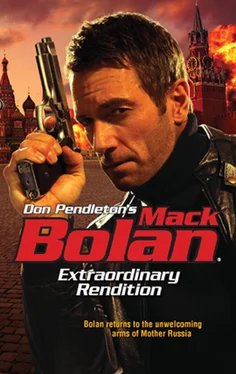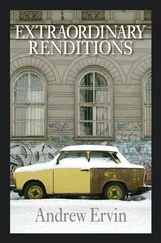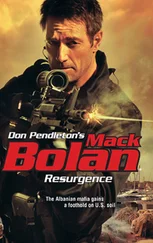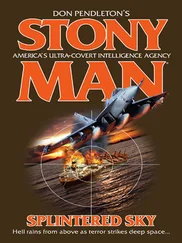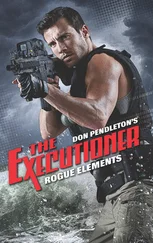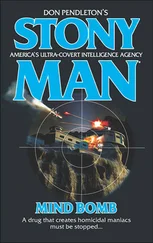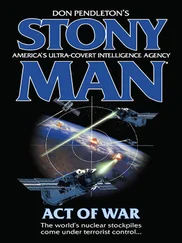This night, Chaliapin was doubly worried, fearing that the problem that vexed him might have originated under his own roof, at the Lubyanka. Like any other intelligence agency or large police department, the FSB was split into sections: Counterintelligence, Economic Security, Operational Information and International Relations, Control, Investigation, Science and Engineering, International Relations, and Chaliapin’s own Service for Protection of the Constitutional System and the Fight against Terrorism. Within such a system—even within a specific department—there were times when the left hand didn’t know what the right hand was doing.
There could be rogues at work under his very nose, following orders Chaliapin hadn’t issued and of which he had no knowledge. Orders which, for all he knew, might include his destruction.
But he would soon find out if that was true. And he would put a stop to it, oh, yes.
No matter who fell by the wayside in the process.
“EVERY TARGET on the list is dangerous,” Anzhela Pilkin said as they drove past Gorky Park, southwest of downtown.
“Targets always are,” Bolan replied.
“Before we start,” Pilkin said, “you need to understand that crime and politics are not distinct and separate in Russia.”
“That’s been my experience around the world,” Bolan observed.
“But it is not the same. In your country, a mafioso bribes the politicians secretly. To pass a law or to ignore one, grant some favor, close the eyes to this or that transaction. Yes?”
“That’s right.”
“And when those dealings are exposed, you have a scandal.”
“True,” said Bolan. “But it seldom changes anything, in the long term.”
“In my country, the Mafiya and politicians make no secret of their friendship. They appear in public, shaking hands, attending balls and banquets. Reporters for the tabloid press observe, but rarely publish. Do you know of Dak Safronov?”
“It doesn’t ring a bell,” Bolan admitted.
“He covered military affairs for the Kommersant, a daily newspaper in Moscow. In 2007 he reported on an army plan for selling arms to Iran and Syria through Belarus. First, he was ‘cautioned’ by the FSB. When that did not dissuade him, he fell from a fifth-story window. Four months before that, it was Anna Politkovskaya, shot by contract killers after she criticized Russian policy toward Chechnya. The president denounced the crime, of course, but added that her influence was ‘very minor.’ Others got the message.”
“So, I’m up against a monolith,” Bolan said.
“We are up against it,” Pilkin corrected him. “And it won’t help that I am part of it. You know the Bible saying about many mansions?”
“Vaguely.”
“It refers to heaven.” She surprised him yet again. “But it applies to Earth, as well. Maybe to hell, for all I know.”
“Meaning, your own people could wind up hunting us?”
“I guarantee it.”
“One more reason why you should consider backing off. It’s your life and career on the line.”
“I’ve thought about it,” she replied. “It makes me angry to consider that I cannot trust my own superiors. If they were hoping that I would be frightened, they’ve made a mistake.”
“Anger’s not the best emotion for a soldier going into battle,” Bolan counseled. “It can breed mistakes and get you killed.”
“I understand this.”
“You’ve heard of General Patton?”
“Blood and Guts,” she said. “I know of him.”
“He once said, ‘No poor bastard ever won a war by dying for his country. He won it by making other bastards die for their country.’”
“Or for their cause.”
“That’s it.”
“So, Mr. Cooper, which poor bastards shall we visit first?”
KIRIL ASTAPKOVICH DREW deeply on his cigar, then waved away his aide with the gold-plated lighter. “Leave us now,” he commanded, and heard the door close seconds later.
“Major Chaliapin,” he said, through a light veil of smoke, “you are aware of why I summoned you?”
Leaving no doubt as to their relative position in the pecking order—or the food chain.
“I am, sir,” Chaliapin replied.
Some might consider it an honor to be summoned by one of Moscow Oblast’s two senators on the Federation Council of Russia. At the present hour, though, most would be wise enough to know that it was not a social call. The senator had to want something, and he wasn’t accustomed to refusal.
“Perhaps you will explain, in that case,” Astapkovich said.
At forty-eight, he was a rising power in United Russia, the Federation’s strongest political party. In the last parliamentary election, United Russia had won 305 seats out of 450 in the State Duma, and eighty-eight out of 178 in the Federation Council. Its centrist message steamrolled special-interest opposition from competitors including Yabloko, Right Cause, Just Russia, Patriots of Russia and the misnamed Liberal Democratic Party of Russia, whose right-wing ultranationalism bore little resemblance to liberal democracy.
“Our friend in Saint Petersburg cannot have instant results on his latest demands,” Chaliapin replied. “So he calls you to draw me away from my work and delay me with threats.”
“You have it, precisely,” Astapkovich said. “There is no need for any hard feelings, however.”
“No, sir. If I gave that impression—”
Astapkovich waved off the budding apology. “Not a bit of it, Major. I simply wish to hear your insight on the matter, which was not, perhaps, explained to me in full.”
“Quite simply, Senator, we received word yesterday that a second attempt would be made to remove Gennady Sokolov from Russian soil.”
“Another G-man melodrama?” Astapkovich said with a sneer.
“No, sir. According to our information, one man was expected to arrive at Domodedovo this evening and proceed from there.”
“One man, in place of…what was it, last time?”
“Eight, sir.”
“That’s confidence for you. But proceed where? To what end? Surely, Saint Petersburg would be a better starting point?”
“That would depend, I must suppose, on what he meant to do.”
“I see,” Astapkovich said, though he saw nothing. “This stranger, then. Is he American?”
“He’s traveling on a Canadian passport, for whatever that’s worth. Flying from Montreal to Moscow, via London. Which proves nothing, as you know, sir.”
“Do we know this pilgrim?”
Chaliapin shook his head. “No, sir. He’s traveling—or was—as Matthew Cooper. We assume it is a cover. Immigration at the airport failed to make a photocopy of his passport, although we requested it.”
“An oversight, you think? Or sabotage?”
This time, Chaliapin shrugged. “Most likely, simple negligence. Failure to pass the order on, perhaps.”
“This Cooper was expected, though. You had his flight number?”
“Yes, Senator.”
“So, he was met?”
Chaliapin cleared his throat. His nervous eyes made a quick circuit of the room, as if seeking escape.
“Sir, I was told… That is, our friend requested that the interception be left to private parties.”
Meaning the Mafiya, presumably the Solntsevskaya Brotherhood. At least they were fairly efficient when it came to killing.
“And?” Astapkovich prodded his anxious guest.
“Sir, I regret to tell you that they failed.”
“Failed to do what, exactly, Major?”
“To detain the subject, sir.”
“Meaning that he escaped.”
“Yes, sir. That’s true.”
“Did they pursue him?”
“To their sorrow, Senator. Four men are dead tonight.”
“And greatly missed, I’m sure. This Cooper killed them?”
“With the possible assistance of a woman.”
Читать дальше
